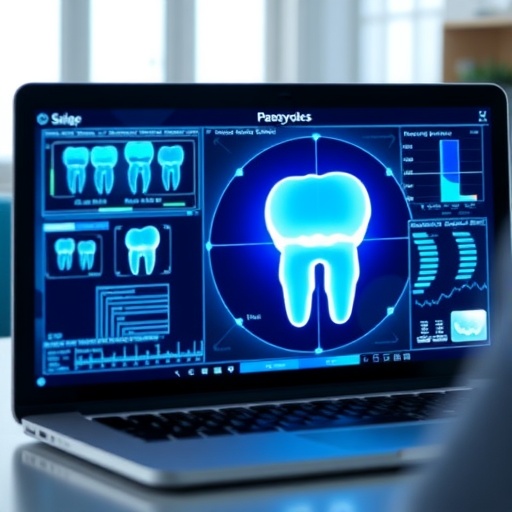The rapid evolution of digital technology in the medical field has paved the way for innovative educational strategies, particularly in specialized areas such as implantology. A groundbreaking pilot study conducted by Zhuoying Cheng and Yanming Lu introduces an enriching approach to training specialists in clinical implantology by integrating digital technology with case-based learning methodologies. This combination aims to enhance skill acquisition and improve educational outcomes for healthcare professionals specializing in implant dentistry. The study, published in BMC Medical Education, marks a significant step toward modernizing clinical training practices and addresses the urgent need for effective educational frameworks in dentistry.
The primary objective of this study was to evaluate the effectiveness of a hybrid educational model that combines the advantages of digital technology with the proven pedagogical benefits of case-based learning. By introducing digital resources such as virtual reality (VR) simulations and interactive learning modules, the authors sought to create an immersive learning environment for specialists engaged in implantology training. This innovative approach is particularly timely, given the increasing complexity of dental implants and the necessity for precise skill sets in this discipline.
One of the significant findings from the pilot study was the remarkable engagement level among the participants. The use of digital tools allowed for a hands-on learning experience that traditional training methods often lack. Participants reported feeling more confident in their skills and better prepared for real-world clinical scenarios following the program. This outcome underscores the power of digital technology in transforming the learning landscape for medical professionals, making them more efficient and competent in their fields.
Furthermore, the study highlighted that case-based learning fosters critical thinking and problem-solving abilities among trainees. By analyzing real-world cases, participants were able to draw connections between theoretical knowledge and practical applications. This immersive learning strategy encouraged interactive discussions and collaborative learning among peers, enriching the overall training experience. Case-based learning encourages dynamic thinking, challenging specialists to navigate complex clinical situations effectively.
The integration of advanced digital technologies allowed for a diverse array of educational resources, including video demonstrations, interactive software, and the use of augmented reality (AR) tools. These resources facilitated a multi-faceted approach to learning, catering to various learning styles among trainees. By engaging visual, auditory, and kinesthetic learners, the program achieved a higher retention of knowledge, which is essential for mastering technical procedures in implantology.
Moreover, the study revealed that incorporating digital technology during training could potentially bridge the gap between theory and practice. With the rapid advancements in dental technology and techniques, keeping up with the latest industry standards can be challenging. Digital applications provide up-to-date information and training simulations that expose specialists to contemporary practices, ensuring their skills remain relevant and current.
Another notable aspect of the research was the adaptability of the training program. The authors emphasized that the digital technology used could be customized to meet the specific needs of different learner groups. Whether it’s novice specialists or more experienced professionals seeking to refine their skills, this flexible training model ensures that all participants can benefit from tailored educational experiences. Such adaptability is crucial in an ever-evolving field, allowing for continuous improvement and lifelong learning among dental professionals.
One challenge encountered during the study was the technological barriers faced by some participants. Not all trainees had prior exposure to advanced digital learning tools, which posed a potential hindrance to their engagement. However, the authors noted that with proper orientation and support, even those with limited experience could adapt and thrive in this new learning environment. This emphasizes the importance of integrating technology training into the professional development of healthcare professionals to minimize resistance and maximize benefits.
The pilot study’s success also illuminated the potential for broader implications in medical education beyond implantology. The use of digital technology and case-based learning could serve as a blueprint for other medical specialties seeking to enhance their training methodologies. As the healthcare landscape continues to evolve, embracing innovative educational approaches will be essential in preparing the next generation of healthcare professionals for the challenges ahead.
In conclusion, the pilot study conducted by Zhuoying Cheng and Yanming Lu represents a pivotal moment in medical education, specifically for specialists in clinical implantology. By merging digital technology with case-based learning, the authors have set a precedent that could reshape training practices across various medical fields. As the medical community continues to explore and implement these educational strategies, the focus must remain on enhancing the skill sets of healthcare professionals to ultimately increase patient care and safety. This study not only serves as a foundation for future research but also as an inspiration for educators to reimagine the ways in which they prepare specialists for real-world medical challenges.
As medical education moves forward, the implications of integrating digital tools into training are profound. The study’s outcomes present a clarion call to educators and institutions worldwide to rethink their teaching methods and invest in technologies that facilitate better learning environments. The marriage of digital innovation and experiential learning could redefine the standard of care within clinical practice, ensuring that healthcare professionals are both knowledgeable and skilled in their respective fields.
In the wake of continuous advancements in digital technology, there lies an exciting opportunity for medical education to evolve. With further research and development, the integration of digital tools in specialty training promises not only to enhance knowledge retention but also to transform the future of patient care. As we embrace this new era in medical education, the potential for improved outcomes in healthcare seems more promising than ever before.
Subject of Research: Digital technology combined with case-based learning in clinical implantology training.
Article Title: A pilot study of digital technology combined with case-based learning in clinical implantology training for specialists.
Article References:
Zhuoying, C., Yanming, L. A pilot study of digital technology combined with case-based learning in clinical implantology training for specialists.
BMC Med Educ 25, 1614 (2025). https://doi.org/10.1186/s12909-025-08176-6
Image Credits: AI Generated
DOI: https://doi.org/10.1186/s12909-025-08176-6
Keywords: Digital technology, Case-based learning, Clinical implantology training, Medical education, Dental professionals, Immersive learning environments.




